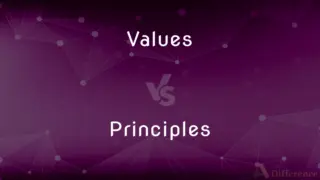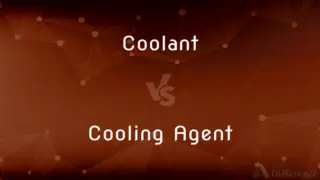Human Being vs. Being Human — What's the Difference?
By Tayyaba Rehman — Published on November 24, 2023
"Human Being" refers to a person or individual of the species Homo sapiens. "Being Human" pertains to exhibiting characteristics and behaviors that are essentially human, like emotions, thoughts, and morality.

Difference Between Human Being and Being Human
Table of Contents
ADVERTISEMENT
Key Differences
Human Being and Being Human serve distinct functionalities in language and philosophy. A "Human Being" is a term that scientifically categorizes us as a species, emphasizing our physical and biological properties. It's a noun, specifically denoting our entity in the biological kingdom. In contrast, "Being Human" revolves around a more philosophical and emotional context. It not only addresses our physicality but goes beyond, exploring attributes such as empathy, morality, and the capacity to engage in complex thought and societal norms.
In another lens, a Human Being represents tangible and measurable aspects, such as anatomy, physiology, and genetics, which are subject to scientific investigation. Being Human, however, eludes strict scientific categorization, dwelling into realms of ethics, spirituality, and social constructs, showcasing how we perceive, react, and establish connections with the surrounding world.
Diving into cultural perspectives, a Human Being might be seen as a biological entity shared universally, irrespective of regional and cultural boundaries. Whereas, Being Human may have varied interpretations, affected by cultural, social, and sometimes, religious norms and beliefs, reflecting disparate human experiences across different contexts.
Examining from an existential perspective, a Human Being could be seen merely as a physical entity, while Being Human might imply a pursuit of purpose, identity, and meaning, traversing through the pathways of emotions, consciousness, and existential quests.
Lastly, the articulation of the two terms also represents a linguistic divergence. "Human Being" is a noun phrase, while "Being Human" is either a present continuous verb phrase (being - a state of existence) or could function as a noun phrase. The former is a straightforward designation, while the latter invites pondering upon the qualitative aspects of human existence.
ADVERTISEMENT
Comparison Chart
Grammatical Function
Noun
Verb Phrase or Noun Phrase
Reference
Physical/Biological Entity
Emotional/Philosophical State
Universality
Uniform Across Cultures
Subject to Cultural Variances
Scientific Perspective
Subject to Biological Study
Involves Ethical/Philosophical Study
Existential Context
Physical and Tangible Entity
Involves Search of Purpose and Meaning
Compare with Definitions
Human Being
A human being refers to any member of the species Homo sapiens.
Every human being has inherent rights.
Being Human
Being human signifies the capability to create and appreciate art.
Being human, they found solace and expression in music.
Human Being
A human being is characterized by bipedal locomotion.
The human being walks upright on two legs.
Being Human
Being human involves expressing empathy.
Being human, she felt deep sorrow for their loss.
Human Being
A human being possesses the capacity for language.
The human being communicates through diverse languages.
Being Human
Being human denotes an adherence to societal norms.
Being human, he followed the established ethical guidelines.
Human Being
A human being represents a blend of intelligence and emotion.
The human being can create art and technology.
Being Human
Being human implies the pursuit of knowledge and understanding.
Being human, we forever seek answers to the unknown.
Human Being
A human being is a biological entity.
The human being has unique cognitive abilities.
Being Human
Being human entails a consciousness that seeks purpose.
Being human, he embarked on a journey for meaning.
Common Curiosities
What does "Being Human" mean philosophically?
"Being Human" philosophically implies reflecting on and embodying qualities like empathy, morality, consciousness, and the pursuit of knowledge and understanding, which are typically associated with human experiences.
How is the term "Human Being" utilized in language?
"Human Being" is used as a noun to refer to an individual member of the species Homo sapiens, often emphasizing biological and physical characteristics.
What is a "Human Being" in biological terms?
A "Human Being" is a member of the species Homo sapiens, characterized by advanced cognitive abilities, upright posture, and the ability to create complex tools and language.
How is "Being Human" employed grammatically?
"Being Human" can function as a verb phrase (being: a state or experience of having existence), or potentially as a noun phrase in various contexts.
Why is a "Human Being" considered intelligent life form?
A "Human Being" is considered intelligent due to advanced cognitive abilities, which include problem-solving, creating complex tools, developing language, and forming structured societal systems.
How does "Being Human" correlate with ethics and morality?
"Being Human" often implies embodying ethical and moral considerations, reflecting on notions of right and wrong, and establishing societal norms and laws based on these reflections.
How does "Being Human" interplay with technology and innovation?
"Being Human" involves utilizing cognitive capabilities for problem-solving, innovation, and creating technology, reflecting the human drive for advancement, exploration, and understanding.
Can "Being Human" refer to the entirety of the human species?
While it primarily refers to embodying human qualities and experiences, "Being Human" is not typically used as a collective noun to describe the human species, which "Human Being" can be.
How does a "Human Being" relate to evolution?
"Human Being" relates to evolution as a species that has undergone a complex evolutionary process, resulting in advanced cognitive abilities, physical attributes, and societal structures.
Can "Human Being" be used to discuss broader human experiences?
While "Human Being" can be used broadly, it primarily emphasizes the biological and physical aspects, and might not encompass the breadth of experiential and emotional states that the term "Being Human" can.
Can “Human Being” imply moral or ethical qualities?
"Human Being" primarily emphasizes biological aspects, but depending on context, it might imply moral or ethical considerations, though less directly than "Being Human."
Is every "Human Being" similar in biological aspects?
While all "Human Beings" share key biological characteristics, there is a wide range of variability in genetics, physical attributes, and abilities.
How does "Being Human" relate to arts and humanities?
"Being Human" often involves the creation and appreciation of arts and engaging in reflections and expressions of human experiences, emotions, and existential queries, which are key aspects of humanities.
Can “Human Being” and “Being Human” be used interchangeably?
Not typically. "Human Being" and "Being Human" convey different emphases—the former primarily biological, and the latter often emotional or philosophical, and they have distinct grammatical uses.
Does "Being Human" have a consistent meaning across cultures?
No, "Being Human" can embody various meanings influenced by different cultural, social, religious, and philosophical perspectives, and thus may vary significantly.
Share Your Discovery

Previous Comparison
Values vs. Principles
Next Comparison
Coolant vs. Cooling AgentAuthor Spotlight
Written by
Tayyaba RehmanTayyaba Rehman is a distinguished writer, currently serving as a primary contributor to askdifference.com. As a researcher in semantics and etymology, Tayyaba's passion for the complexity of languages and their distinctions has found a perfect home on the platform. Tayyaba delves into the intricacies of language, distinguishing between commonly confused words and phrases, thereby providing clarity for readers worldwide.












































